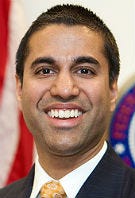FCC Chair Rips Sprint, Subsidy Issue Could Hold Up T-Mobile MergerFCC Chair Rips Sprint, Subsidy Issue Could Hold Up T-Mobile Merger
It's being called a "worst case" violation.

The Federal Communications Commission (FCC) says Sprint took millions of dollars in subsidies meant to help make phone and broadband service more affordable for low-income consumers.
The FCC has learned that Sprint claimed monthly subsidies for serving about 885,000 Lifeline subscribers even though those subscribers were not using the service. In response, Commissioner Geoffrey Starks said this directly impacts the FCC’s review of the proposed merger between Sprint and T-Mobile, and called for a pause in the review.
The FCC has launched an investigation and said Sprint’s actions would be a violation of a key rule – the “non-usage” rule – designed to prevent waste, fraud and abuse in the Lifeline program. The 885,000 subscribers represent nearly 30% of Sprint’s Lifeline subscriber base and nearly 10% of the entire Lifeline program’s subscriber base.

FCC’s Ajit Pai
“Lifeline is an important component of our efforts to bring digital opportunity to low-income Americans, and stopping waste, fraud and abuse in the program has been a top priority of mine since I’ve been at the commission,” said FCC chairman Ajit Pai. “It’s outrageous that a company would claim millions of taxpayer dollars for doing nothing. This shows a careless disregard for program rules and American taxpayers. I have asked our enforcement bureau to investigate this matter to determine the full extent of the problem and to propose an appropriate remedy.”
Providers participating in the Lifeline program receive a $9.25 monthly subsidy for most subscribers, which the company must pass along to the consumers as a discount. For most consumers served by the mobile Lifeline product marketed by Sprint and many other providers, the subsidy makes the service free to the consumer.
Keep up with the latest channel-impacting mergers and acquisitions in our M&A roundup. |
The non-usage rule requires Lifeline providers of “free” service to de-enroll subscribers who don’t use their phones — a rule meant to protect Lifeline from wasting payments on service not provided, according to the FCC.
Under the non-usage rule, providers of free service may only be reimbursed for a Lifeline subscriber if that subscriber has used the service at least once in the past 30 days. Providers must de-enroll inactive subscribers after giving them 15 days’ notice. Program-wide, the rule resulted in about 3.1 million de-enrollments in 2018.
Sprint’s “apparent disregard” of the non-usage rule initially came to light as a result of an investigation by the Oregon Public Utility Commission, Pai said.
Starks said how Sprint and T-Mobile were going to handle Lifeline was a prominent part of their merger pitch, “so I am alarmed and concerned about such a massive inaccuracy in a core part of the transaction.”
“There is no credible way that the merger before us can proceed until this Lifeline investigation is resolved and responsible parties are held accountable,” he said. “Without the benefit of the findings of this investigation into what appears to be the worst case of Lifeline violations in FCC history, it is impossible for us to trust in the integrity and completeness of the record, evaluate the character and fitness of the applicants, and exercise our statutorily defined obligation to grant only license transfers that serve the public interest. I call for our staff to conduct a thorough review during this pause — the integrity of our merger review process is at stake.”
The Commission now has multiple high-profile investigations implicating Sprint and/or T-Mobile that, to this date, remain unresolved, Starks said.
Read more about:
AgentsAbout the Author
You May Also Like


